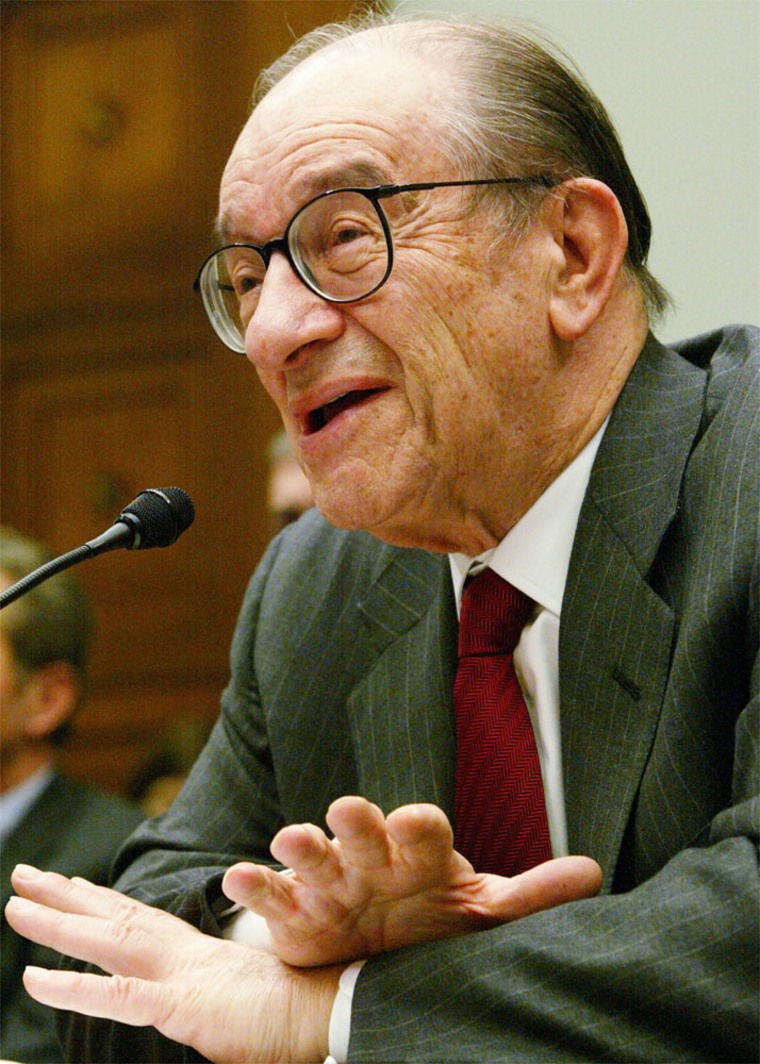Federal Reserve Chairman Alan Greenspan signaled to Wall Street Wednesday that the central bank is in no hurry to raise interest rates, saying policy-makers can afford to be patient despite recent “impressive gains” in the nation’s economic output.
Stock prices rallied sharply and bond market interest rates fell on the comments, as investors gained confidence that the central bank is unlikely to begin tightening credit until the second half of this year or even 2005.
Short-term interest rates, which are controlled by the Fed, "will eventually need to rise," Greenspan told the House Financial Services Committee. “However, with inflation very low and substantial slack in the economy, the Federal Reserve can be patient in removing its current policy accommodation.”
Greenspan’s semiannual congressional testimony had been anxiously awaited since the central bank last month eliminated from its formal policy statement an unusually explicit promise to leave rates low for a “considerable period.” Greenspan’s focus Wednesday on excess economic capacity – including an unwelcome lack of job growth – underscored the Fed’s determination to ensure the current expansion is robust and sustainable.
“There was a sense he was going to brace us for a tightening cycle as he did in July 1993, and the bottom line is that he didn’t do it,” said David Rosenberg, chief North American economist at Merrill Lynch. “He is telling the markets, ‘We’re not going to jump the gun.' … For all the handholding that the market demands, I don’t think he could be any clearer.”
Stock prices took off as soon as Greenspan’s prepared statement was released, and by day's end the Dow Jones industrial average was up 124 points, or 1.2 percent. Treasury security prices also moved up sharply, sending the yield on the benchmark 10-year bond down to 4 percent from about 4.09 percent.
Greenspan and his colleagues on the Fed’s Open Market Committee cut the overnight federal funds rate to a 45-year low of 1 percent in June, helping to ensure second-half economic growth that was the strongest in 19 years.
"Overall, the economy has made impressive gains in output and real incomes," Greenspan said. "However, progress in creating jobs has been limited."
In response to questioning, he said forecasters including those at the central bank failed to anticipate the continued strong growth in productivity that has allowed U.S. companies to boost output and profits without significant hiring.
But he said it appears the “backlog of unexploited inefficiencies is probably running out,” meaning employers will have to accelerate their hiring soon just to keep up with existing demand. He said the Bush administration’s projection this week that the economy will add 2.6 million payroll jobs this year “is probably feasible.”
And he said the unemployment rate probably could fall to about 4 percent from its current 5.6 percent level without threatening to boost inflation pressures.
Mark Vitner, senior economist at Wachovia Securities, said Greenspan’s comments make it unlikely the Fed would raise rates before its August meeting of policy-makers.
“The most important thing to note is that there were no surprises, and I think the Fed didn’t want to surprise anyone here,” he said.
“They wanted to let the word know that the recovery is still under way, and it looks like it is broadening and gaining momentum, but that inflation is so low right now there is no reason they need to rush into raising interest rates,” Vitner said. “But he also issued a fairly easy-to-understand warning that at some point rates will have to rise.”
Greenspan also delivered the Fed’s semiannual monetary policy report to Congress, which included the projection that the gross domestic product will grow 4.5 to 5 percent this year after inflation, moderately higher than the 3.75 to 4.75 percent projected in July.
Last year the economy grew 4.3 percent, according to preliminary estimates.
Inflation, as the Fed measures it, is expected to fall to 1 or 1.25 percent this year from 1.4 percent last year.
Greenspan faced sharp questioning from both Republicans and Democrats about the lack of job growth and the loss of manufacturing jobs to China and other countries that offer cheaper labor, hinting at the frustration of voters in many parts of the country.
"My father was in Congress for 26 years and I have been here since 1994, and I have never seen the frustration I am seeing now," said Rep. Walter Jones, R-N.C.
But Greenspan suggested it was futile to try and prevent such outsourcing, saying that limiting imports from China would reduce the U.S. standard of living without necessarily improving the availability of jobs. And he said despite the steady loss of manufacturing jobs for decades, U.S. living standards have continued to rise as the U.S. economy has shifted to one increasingly based on value-added services, information-based businesses and technology.
“While it is happening it is very distressful to people,” he said of the shift. “The problem is you cannot readily stop progress. You can try, but you will fail.”
Greenspan also warned Congress about the potential risk posed by rising federal budget deficits. If foreign and domestic investors lose confidence that Congress will take the actions needed to bring the budget more closely in balance, long-term interest rates could rise appreciably, constraining business growth, Greenspan said.
“The fiscal issues that we face pose long-term challenges, but federal budget deficits could cause difficulties even in the relatively near term,” he said.
He reiterated his suggestion that Congress restore pay-as-you-go financing and spending caps that would force a return to fiscal discipline.
Greenspan is scheduled to deliver similar testimony to the Senate Banking Committee Thursday.
